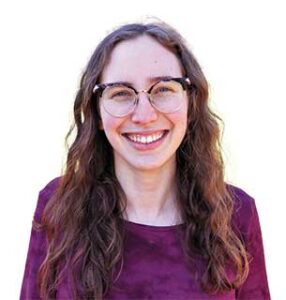
Trinity College senior Alisa Levin ’21 recently was selected to receive a 2021 National Science Foundation (NSF) Graduate Research Fellowship (GRF), which will fund three years of her studies and research work in graduate school. Levin, a computer science major and models and data minor, plans to begin a Ph.D. program in computer science in the fall, focusing on neural computation.
This NSF fellowship recognizes and supports outstanding graduate students who are pursuing full-time, research-based master’s and doctoral degrees in science, technology, engineering, and mathematics (STEM) or in STEM education and have demonstrated their potential for significant research achievements.
“I’m so excited about this fellowship,” Levin said. “It means so much to me because it’s hard to get as an undergraduate, when you don’t already have the support of a lab. [It] … will allow me flexibility in my graduate research. It brings me a certain level of autonomy and means I don’t have to be tied to a specific grant.”
As a first-year undergraduate coming to Trinity from New York City, Levin was part of the Interdisciplinary Science Program (ISP), a Gateway Program for top students interested in the sciences. “Being with a small, close-knit group of students with a shared passion for science and a desire to learn about research was an incredible introduction to college,” Levin said. “Connecting with students who also cared about research, science, and learning was inspiring.”
Alison Draper, director of the ISP and Trinity’s Science Center, noted, “It is very unusual for a student to win a GRF before they begin their graduate work. The win speaks to Alisa’s incredible intellectual curiosity and hard work.”
Last year, Levin was one of three Trinity juniors to receive the Barry Goldwater Scholarship, awarded to students who wish to pursue careers in the natural sciences, mathematics, and engineering. In addition to her interests in science, Levin is a member of Trinity’s equestrian team.
“At Trinity, what I’ve appreciated most is the level of support I’ve received from all of my professors. Working in [Professor of Engineering] Taikang Ning’s electrical engineering lab for the last four years has taught me so much about the research process, and my adviser, [Associate Dean for Faculty Development and Associate Professor of Computer Science] Takunari Miyazaki, has supported me every step of the way through my computer science education. They’ve all helped build my confidence when I needed it and gave me advice that helped me stay on the right path.”
